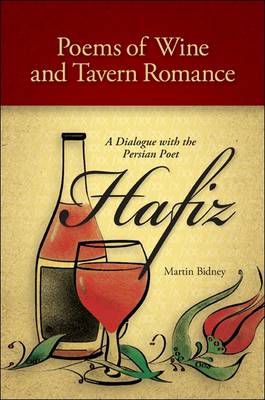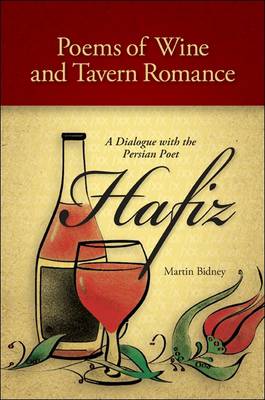
- Afhalen na 1 uur in een winkel met voorraad
- Gratis thuislevering in België vanaf € 30
- Ruim aanbod met 7 miljoen producten
- Afhalen na 1 uur in een winkel met voorraad
- Gratis thuislevering in België vanaf € 30
- Ruim aanbod met 7 miljoen producten
Zoeken
€ 50,45
+ 100 punten
Uitvoering
Omschrijving
"In his poetry, Hafiz has inscribed undeniable truth indelibly ... Hafiz has no peer!" -- Goethe
Poems of Wine and Tavern Romance includes 103 pioneering poems by the medieval Persian poet and Sufi monk Muhammad Shemseddin Hafiz (ca. 1320-1389). With the rich complexity of a character in Shakespeare, Hafiz celebrates his pleasures and longed-for lovers in a context of Qur'anic narrative allusion, allowing his poems to hint at stages in a spiritual quest.
First translated into German in 1814, by Joseph von Hammer, Hafiz's poetry initiated a revolution in the mind of Johann Wolfgang von Goethe, and Hafiz became, for Goethe, a Muslim mentor. Hafiz's love poems are mainly directed to the men he met in taverns, but Hammer often changed the gender of the addressees to placate contemporary opinion in Germany. Hammer rendered Hafiz's poetry in a variety of newly invented verse forms as well as traditional ones carried over from ancient Greece and Rome, which he felt would make them more acceptable to readers acquainted with such themes in Greek and Latin verse.
Though always faithful to Hammer's pioneering poetic forms, Martin Bidney's new translations restore the genders as they appeared in the original Persian. In his poetic "replies" to Hafiz, Bidney clarifies the implications of Hafiz's Qur'anic allusions and Islamic legendary references, and he also elucidates parallels between medieval Persian and various Western cultures by introducing newly translated relevant passages from such works as Carmina Burana, Ovid's Amores, and Horace's Odes.
Hammer's translation of Hafiz was already a pioneering West-East synthesis when it inspired Goethe to try to top it in his own experimental West-East Divan (translated by Bidney in 2010), and Bidney's translation of Hafiz's groundbreaking, varied, verbally colorful, and melodious poetry will delight the general reader and fascinate the scholar.
Poems of Wine and Tavern Romance includes 103 pioneering poems by the medieval Persian poet and Sufi monk Muhammad Shemseddin Hafiz (ca. 1320-1389). With the rich complexity of a character in Shakespeare, Hafiz celebrates his pleasures and longed-for lovers in a context of Qur'anic narrative allusion, allowing his poems to hint at stages in a spiritual quest.
First translated into German in 1814, by Joseph von Hammer, Hafiz's poetry initiated a revolution in the mind of Johann Wolfgang von Goethe, and Hafiz became, for Goethe, a Muslim mentor. Hafiz's love poems are mainly directed to the men he met in taverns, but Hammer often changed the gender of the addressees to placate contemporary opinion in Germany. Hammer rendered Hafiz's poetry in a variety of newly invented verse forms as well as traditional ones carried over from ancient Greece and Rome, which he felt would make them more acceptable to readers acquainted with such themes in Greek and Latin verse.
Though always faithful to Hammer's pioneering poetic forms, Martin Bidney's new translations restore the genders as they appeared in the original Persian. In his poetic "replies" to Hafiz, Bidney clarifies the implications of Hafiz's Qur'anic allusions and Islamic legendary references, and he also elucidates parallels between medieval Persian and various Western cultures by introducing newly translated relevant passages from such works as Carmina Burana, Ovid's Amores, and Horace's Odes.
Hammer's translation of Hafiz was already a pioneering West-East synthesis when it inspired Goethe to try to top it in his own experimental West-East Divan (translated by Bidney in 2010), and Bidney's translation of Hafiz's groundbreaking, varied, verbally colorful, and melodious poetry will delight the general reader and fascinate the scholar.
Specificaties
Betrokkenen
- Auteur(s):
- Vertaler(s):
- Uitgeverij:
Inhoud
- Aantal bladzijden:
- 230
- Taal:
- Engels
- Reeks:
Eigenschappen
- Productcode (EAN):
- 9781438447889
- Verschijningsdatum:
- 2/07/2014
- Uitvoering:
- Paperback
- Formaat:
- Trade paperback (VS)
- Afmetingen:
- 150 mm x 229 mm
- Gewicht:
- 322 g

Alleen bij Standaard Boekhandel
+ 100 punten op je klantenkaart van Standaard Boekhandel
Beoordelingen
We publiceren alleen reviews die voldoen aan de voorwaarden voor reviews. Bekijk onze voorwaarden voor reviews.








